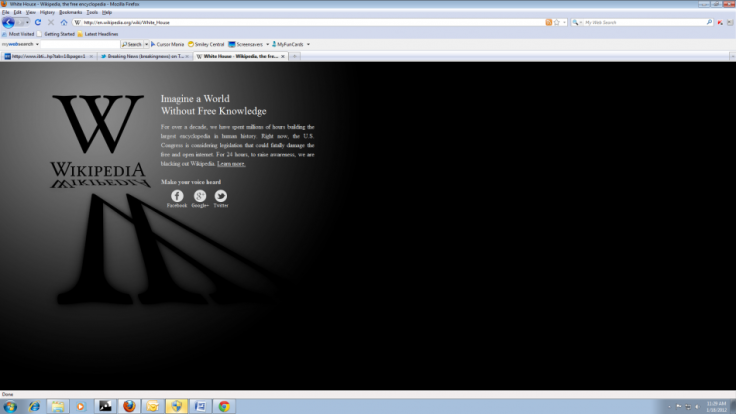Wikipedia Blackout: When the Gateway to Knowledge is Shut

Just a single statement greets would-be users of Wikipedia.
"Imagine a World Without Free Knowledge," it says.
Wikipedia's existence depends on a free, open and uncensored internet and hence it is left with no other option but stage a protest by blacking out the English version of the website, its administrators said.
Here's how it's been described by the three Wikipedia administrators who formally facilitated the community's discussion: "Over the course of the past 72 hours, more than 1,800 Wikipedians have assembled to discuss proposed actions that the community might wish to take against Sopa and Pipa.
This is by far the largest level of participation in a community discussion ever seen on Wikipedia, which illustrates the level of concern that Wikipedians feel about this proposed legislation.
The overwhelming majority of participants support community action to encourage greater public action in response to these two bills. Of the proposals considered by Wikipedians, those that would result in a "blackout" of the English Wikipedia in concert with similar blackouts on other websites opposed to SOPA and PIPA have received the strongest support.
On careful review of this discussion, the closing administrators note the broad-based support for action from Wikipedians around the world, not just from within the United States.
The primary objection to a global blackout came from those who preferred that the blackout be limited to readers from the United States, with the rest of the world seeing a simple banner notice instead. Wikipedia also noted that roughly 55% of those supporting a blackout preferred that it be a global one, with many pointing to concerns about similar legislation in other nations.
Apparently, the decision to shut down the English Wikipedia wasn't made by the executive director of Wikimedia alone; but, it was a joint decision taken by editors, through a consensus decision-making process.
My hope is that when Wikipedia shuts down on January 18, people will understand that we're doing it for our readers. We support everyone's right to freedom of thought and freedom of expression. We think everyone should have access to educational material on a wide range of subjects, even if they can't pay for it. We believe in a free and open Internet where information can be shared without impediment. We believe that new proposed laws like SOPA and PIPA, and other similar laws under discussion inside and outside the United States, don't advance the interests of the general public.
Wikipedia has spent millions of hours building the largest encyclopedia in human history and the ensuing threat from SOPA and PIPA could destroy the prospects of free and open internet knowledge sharing. There could be copyright restrictions on what is shared on the net and also lead to lawsuits with infringements on content rights.
There would not be any scope of personal opinion about a shared entity unless authorized by the content owners. Wikipedia reiterates the problems that might arise in the near future owing to the SOPA and PIPA amendment," the statement said.
"Among other serious problems in the current draft of the bills, the requirement exists for US-based sites to actively police links to purported infringing sites. These kinds of self-policing activities are non-sustainable for large, global sites - including ones like Wikipedia," quotes Wikipedia on its home page.
It adds: "The legislative language is ambiguous and overly broad, even though it touches on protected speech. Congress says it's trying to protect the rights of copyright owners, but the "cure" that SOPA and PIPA represent is worse than the disease."
How exactly Sopa is a real big threat to free and open world of Wikipedia?
Sopa would require US sites to take on the heavy burden of actively policing third-party links for infringing content. And even with the DNS provisions removed, the bill would give the US government extraordinary and loosely-defined powers to take control over content and information on the free web.
Taking one bad provision out doesn't make the bills okay, and regardless, Internet experts agree they won't even be effective in their main goal: halting copyright infringement.
Is there still a way to access Wikipedia during the blackout?
The English Wikipedia will be accessible on mobile devices and smart phones. Because the protest message is powered by JavaScript, it's also possible to view Wikipedia by completely disabling JavaScript in your browser.
How will Sopa and Pipa amendments damage the open and free world of knowledge sharing?
The Wikimedia Foundation is the sole operator of 11 free knowledge projects managed and built by a community of over 100,000 active volunteers.
Besides, the Wikipedia, free encyclopedia containing more than 20.6 million articles in more than 280 languages is the most comprehensive and widely used reference material humans have ever compiled. More than100,000 active volunteers contribute new content every month.
Furthermore, the general public risk losing the Wikimedia Commons<sup>TM Shared media repository. It is the repository of almost 13 million freely usable images, sound and video files, serving both Wikimedia's projects and countless other educational and informational needs.
Finally, it would be a great setback to the open source community to risk losing MediaWiki® Open-source wiki software. It is the leading open-source software on the Internet which acts as the backbone for all of the Wikimedia Foundation's wikis and thousands of other wiki communities.
Must Read:
Megaupload Shutdown: Who's Next? RapidShare, SoundCloud or DropBox?
© Copyright IBTimes 2024. All rights reserved.







